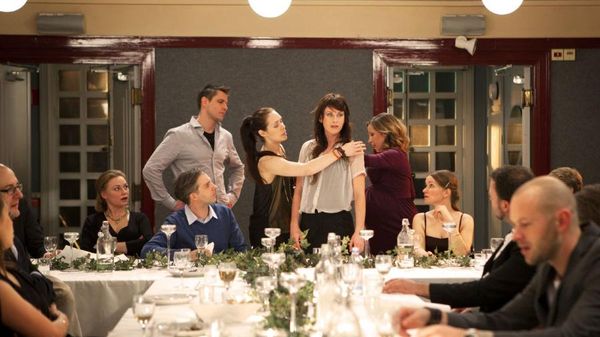Eye For Film >> Movies >> The Reunion (2013) Film Review
The Reunion
Reviewed by: Jennie Kermode

Films about bullying tend to push the drama in one of three ways. There are the tragic suicides (Dead Poets Society), the violent acts of revenge (Hello Herman), and the unlikely triumphs that suddenly lead to social success (The Karate Kid etc.) Each seems to offer resolution, but if viewers and even characters are left with an empty feeling, it may because no bully has really been obliged to confront what they've done. The Reunion sees a woman seek out a different kind of reckoning, blending layers of fact and fiction in a self consciously arty way that shouldn't be allowed to distract from the keen intelligence at its core.
The artist in question is Anna Odell, drawing on personal experience to create layered fictional versions of herself: at a 20 year school reunion; and making a film about a 20 year school reunion to which she was not invited. Odell is most famous for staging a suicide on Liljeholmsbron in 2009, an action that was heavily criticised for drawing away services that could have been there to help genuinely vulnerable people - doubtless a genuine concern for many, but also a convenient way of drawing attention away from its purpose, which was to critique the way Swedish society and healthcare providers treat the mentally ill. Here, the criticism of the act is raised with no defence given. It's a detail that reveals something about Odell's working methods. This film has understandably been criticised for being self indulgent, but Odell may simply have chosen to work with the experiences she has closest to hand in order to expose aspects of human interaction that are rarely looked at soberly. The message is the thing, and if she has put former classmates through the wringer here, she has certainly done so to herself as well. The fictional Odells are characters whose testimony we are invited to be cautious about.

Critical reactions to this film have been mixed to say the least. It's easy to understand why people might dislike it; Odell makes her audiences, fictional and actual, deliberately uncomfortable as she explores concepts of narrative and which kinds of speech we do and don't value. She's acutely aware of the power structures that dictate who is allowed to laugh, who is allowed to complain, and why some people's outbursts are seen as righteous whilst other people's are seen as whining.
"We were just children" is the phrase we hear repeated over and over again as the stories unfold. But do personalities really change that much? Do people behave differently as adults simply because - until pushed into a situation where the usual rules seem to have been set aside - they're expected to? There are questions here that go far beyond the playground, peeling back the veneer of maturity and sophistication that is often assumed by outsiders to be the reality of Swedish society. Like Jodie Foster classic The Accused, it's addressing not simply those who do harm but the bystanders - who, of course, include the audience. In a film that invites everyone to examine their own perspectives and memories closely, it's dangerous to assume that Odell is presenting herself as a hero; she is just one part of an experiment that dares us to step outside our comfort zones, to learn something about the world.
The Reunion is shot in a very stagey way which echoes the artificiality of the reunion phenomenon, essentially a gathering of strangers who remember their roles better than their lines. Like many other films using this format, it sets out to establish a series of claustrophobic settings that lead up to a soaring final shot, here rather crudely reminding us of the sense of confinement that a school can generate and of the much greater opportunities the wider world can offer. Seen from above, the playground is starkly reminiscent of a sound stage, actors' marks scrawled across it. Odell is trying to write her own script, but is that simply a function of the role she was given?
Reviewed on: 11 Jul 2015

















